On November 6, 1913, Mohandes K. Gandhi was arrested for participating in a march of Indian miners in South Africa.
Gandhi Arrested
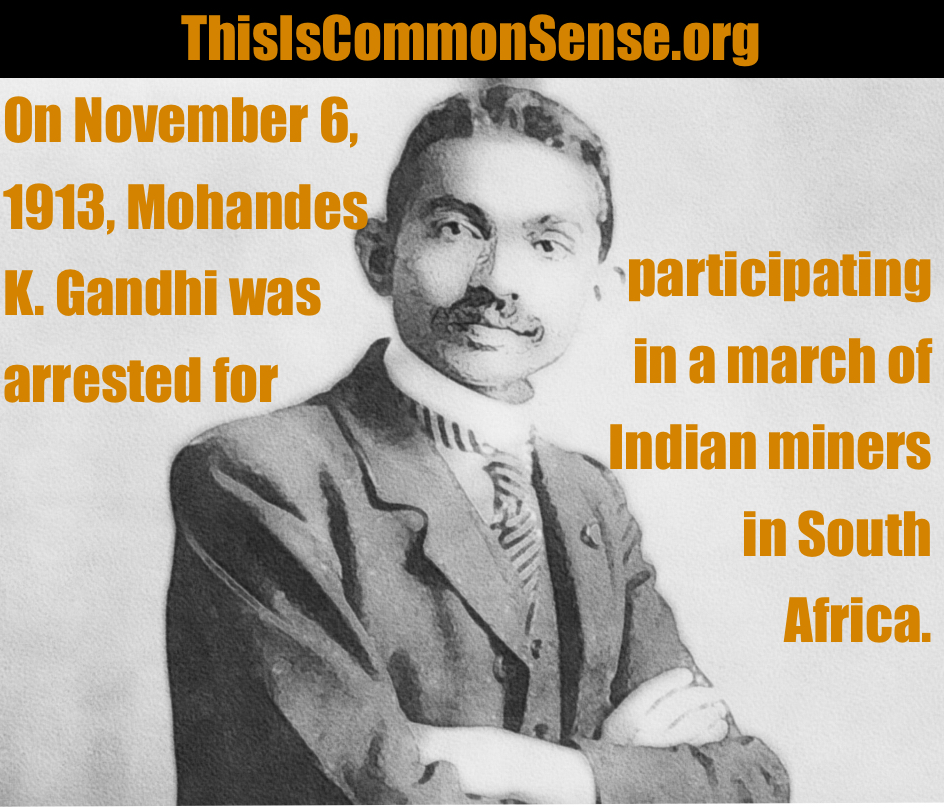


I’m also anxious to find out who wins control of the U.S. Senate and House — and most excited to see the outcome of 11 statewide ballot measures that I’ve been engaged in — across ten states, including eight states with Citizen Only Voting Amendments on the ballot, most critically North Carolina and Wisconsin.
But my elation in expectation on this fine day is greatly tempered by the sobering reality that awaits on Wednesday. No matter who wins … something approaching half the country will be deeply distraught.
I’m tired of hearing that America is “over” — that this experiment in freedom and democracy has run its course and is destined to soon fail. But on Wednesday I’ll no doubt hear that chorus again from the losing side.
No one gets a prize for predicting America’s demise — only for preventing it.
What worries me most, however, are the challenges Wednesday’s winner will face from a world at war in Europe and the Middle East, with conflict rapidly approaching in Asia.
“World War III,” as columnist George Will wrote weeks ago, “has begun.”*
Yet, the election has been largely devoid of serious foreign policy discussion. “The U.S. presidential campaign is what reckless disregard looks like,” quipped Will. “Neither nominee has given any evidence of awareness of, let alone serious thinking about, the growing global conflagration.”
Whoever wins today (or whenever): Buckle your seatbelts.
This is Common Sense. I’m Paul Jacob.
* Mr. Will believes history will look back to mark the beginning of the Third World War with “Russia’s 2014 seizure of Crimea,” during the Obama administration.
Illustration created with Midjourney
—
See all recent commentary
(simplified and organized)
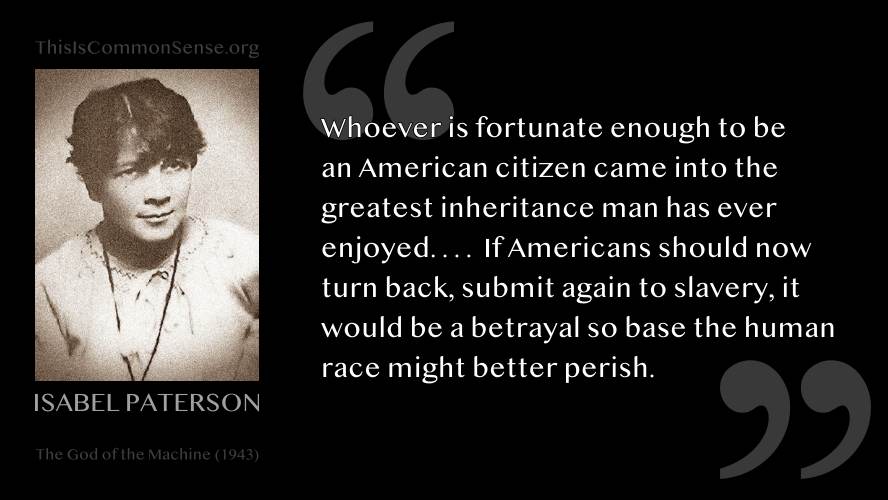
Whoever is fortunate enough to be an American citizen came into the greatest inheritance man has ever enjoyed. He has had the benefit of every heroic and intellectual effort men have made for many thousands of years, realized at last. If Americans should now turn back, submit again to slavery, it would be a betrayal so base the human race might better perish.
Isabel Paterson, The God of the Machine (1943), p. 292.
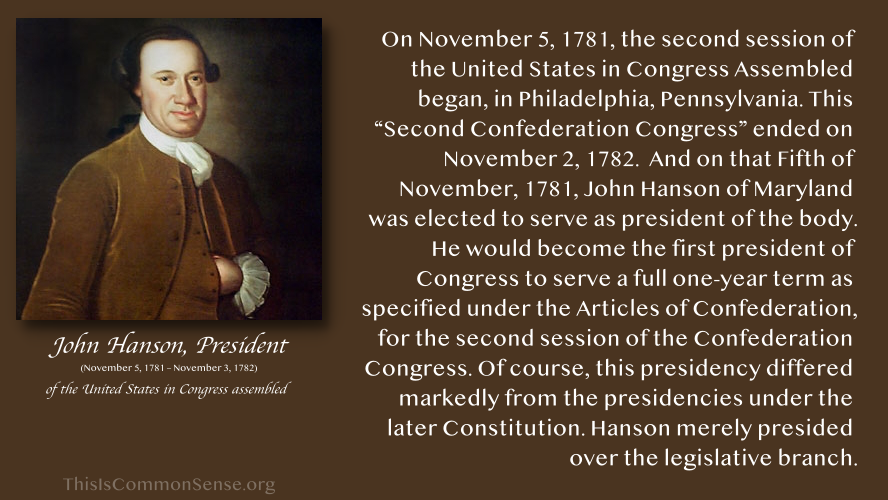
On November 5, 1781, the second session of the United States in Congress Assembled began, in Philadelphia, Pennsylvania. This “Second Confederation Congress,” as it is popularly known, ended on November 2, 1782.
And on that Fifth of November, 1781, John Hanson of Maryland (pictured above) was elected to serve as president of the United States in Congress Assembled. He would become the first president of Congress to serve a full one-year term as specified under the Articles of Confederation, for the second session of the Confederation Congress. Of course, this presidency was nothing like the presidencies under the Constitution. Hanson merely presided over Congress.
On November 5, 1872, Susan B. Anthony defied the law to vote, and was later fined $100.
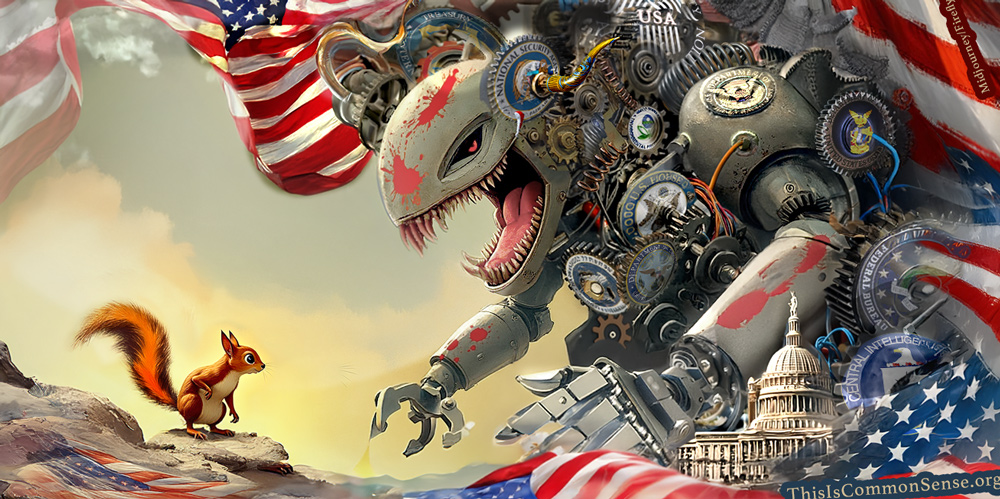
In an age of short attention spans and viral memecraft, the latest cultural moment regarding a squirrel could influence more minds about politics than all the quips, speeches and gaffes of Trump and Harris combined.
The news is not hard to understand. “Wild squirrel that was taken in by Mark Longo seven years ago was confiscated after conservation officials received reports of ‘potentially unsafe housing of wildlife,’” is how The Guardian put it on Halloween.
“An orphaned squirrel that became a social media star called Peanut was euthanized after New York authorities seized the beloved pet after a raid on his caretaker’s home, authorities said,” was Saturday’s Guardian update.
After the six- (or ten-) officer raid and after the execution, the deluge: ire and satire flooded the meme-o-sphere.
Not a few governments enforce laws against taming wild animals. One concern is rabies, though the rabies danger of a squirrel rescued as a baby and raised indoors must be preciously close to ZERO. When individuals own tigers and other predators, the danger is obvious — but certainly P’nut was not such a concern.
This is just the way the modern State operates: bureaucratically, with lumbering indifference to property rights (the squirrel was indeed owned, and housed privately), liberty (sans harm, the case to leave well enough alone is pretty clear), and common sense (Andy Griffith would not have put down the squirrel; he would have told Barney Fife to put down the revolver).
How ridiculous and cruel government can be!
Maybe the last half dozen of undecided Americans will pull the lever, Tuesday, for less nonsensical government intrusion because of it.
It certainly doesn’t make the meddler class look good.
This is Common Sense. I’m Paul Jacob.
Note: We also mourn the passing of Fred the Raccoon, a fellow rescuee at P’Nut’s Freedom Farm, also confiscated and executed by the State of New York for the same trivial infraction of his owner: not licensed by the State.
Illustration created with Midjourney and Firefly
—
See all recent commentary
(simplified and organized)
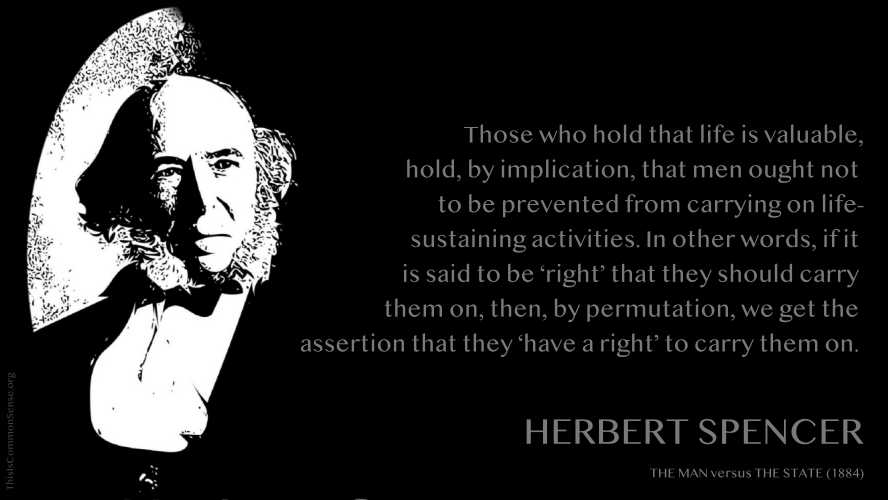
Herbert Spencer, “The Great Political Superstition,” The Man versus The State (1884).
If we adopt pessimism as a creed, and with it accept the implication that life in general being an evil should be put an end to, then there is no ethical warrant for these actions by which life is maintained: the whole question drops. But if we adopt either the optimist view or the meliorist view — if we say that life on the whole yields more pleasure than pain; or that it is on the way to become such that it will yield more pleasure than pain; then these actions by which life is maintained are justified, and there results a warrant for the freedom to perform them. Those who hold that life is valuable, hold, by implication, that men ought not to be prevented from carrying on life-sustaining activities. In other words, if it is said to be ‘right’ that they should carry them on, then, by permutation, we get the assertion that they ‘have a right’ to carry them on. Clearly the conception of ‘natural rights’ originates in recognition of the truth that if life is justifiable, there must be a justification for the performance of acts essential to its preservation; and, therefore, a justification for those liberties and claims which make such acts possible.